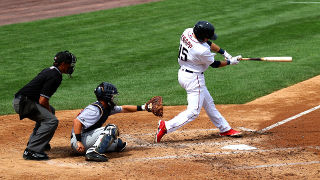Sports Poll on MLB Rule Changes Featured in Forbes, The Athletic and FiveThirtyEight
Wednesday, April 12th, 2023

In Forbes, the article “Poll Shows By 4-To-1 U.S. Population Excited For 2023 MLB Season; Pitch Clock And Other MLB Rule Changes Seen As Positive,” detailed the findings:
As the 2023 Major League Baseball season gets underway this week, a majority of fans and non-fans alike see the rule changes that MLB is putting into place this year – which includes a pitch clock – have more excitement about the highest level of baseball than last year at this time.
The poll conducted by Seton Hall shows enthusiasm for the upcoming season up by 20 points over the same poll last year. The polling looked at MLB fans, sports fans, and the general population.
Among the general population, 24% said they are more enthusiastic about the season compared to just 9% when the poll was run in 2022. For sports fans, excitement jumped from 16% last year to 36% this year. Avid sports fans clocked in at a robust 52% compared to 33% in 2022. For those that consider themselves dedicated MLB fans, 47% are thrilled with changes headed into the regular season.
“Of all the professional sports, Major League Baseball has been the most resistant to change,” saidProfessor Charles Grantham, Director of the Center for Sport Management within Seton Hall’s Stillman School of Business, which sponsors the Poll. “The MLB Commissioner, the teams, and the MLB Players Association have to be excited with these numbers as the fans, including the diehard MLB fans, are embracing these changes like the pitch clock and larger bases, among others.”
In The Athletic, the poll was cited in “MLB in 2023: 9 numbers that will define a transformative season with new rules” regarding the pitch clock and the prospect of shorter games. Jayson Stark writes:
But even with all of that, there is optimism that the average nine-inning game will settle in at somewhere between 2 hours, 40 minutes and 2:45. And one baseball official I surveyed still thinks 2:40 is eminently doable.
“Think about it,” he said. “If your average game time is 2:40, that means that half your games are going to be shorter than 2:40. So you’re going to have games, probably ranging from two hours to 2:40 on the short end, and your higher-scoring games are going to be 2:40 to 3:05 or 3:10. So there are still going to be a lot of nights where you’re out of there at 9 (p.m.) or 9:15 (p.m.). And that’s a full hour earlier than before.”
I hear all the time from fans who actually don’t think that’s a good thing. But if you’re one of those people, you should know you’re not in the mainstream anymore. Check out the results of a new Seton Hall Sports Poll.
Question: Would you watch more MLB if the games were shorter?
MLB FANS: 52% YES, 31% NO.*
AVID FANS: 57% YES, 28% NO.*
(*All other responses: No opinion/don’t know)
We rest our case. Your witness.
In FiveThirtyEight, best known for its coverage and analysis of election polling, the Sports Poll was cited in “Pollapalooza,” which noted that:
Baseball fans are happy with some of the new changes coming to the sport this season. According to a YouGov/Seton Hall Sports Poll conducted March 6-9, 45 percent of adults and 65 percent of MLB fans support the addition of a pitch clock to speed games up. Thanks largely to the pitch clock, spring-training games through mid-March were around 25 minutes shorter on average than all spring training games last year.
The full release for the poll, including charted breakdowns of results and questions can be found at “Poll Shows Enthusiasm for ’23 MLB Season, Aided in Part by Pitch Clock and Shorter Games.”
Categories: Athletics, Business, Research





